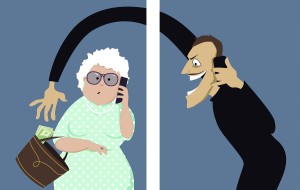Don’t Fall Victim to the Grandparent Scam
 You’re a grandparent, and you get a phone call or an email from someone who identifies themselves as your grandchild. “I’ve been arrested in another country!” they say. “I need money wired quickly to pay my bail. Please, don’t tell my mom or dad because they’ll only get angry!”
You’re a grandparent, and you get a phone call or an email from someone who identifies themselves as your grandchild. “I’ve been arrested in another country!” they say. “I need money wired quickly to pay my bail. Please, don’t tell my mom or dad because they’ll only get angry!”
This type of emergency scam has been around for years. It typically occurs when a grandparent receives a call from a scammer pretending to be a family member in need of money immediately. The scammer often claims they have been in a car accident, are having trouble returning from a foreign country, or have been arrested and need to be bailed out. The grandparent is asked to wire some money through a cash transfer company immediately. Often, victims send the money, and do not verify the information until after the money is sent.
Scam artists defraud millions of people each year by phone, by mail, online, and in person using many different tactics. The grandparent scam is one of the most heartbreaking. That is why it is important to stay on guard. Think twice before you hand over any of your money or personal information.
The Competition Bureau shares some tips on how to protect yourself and your family to avoid being a victim:
- Do not reveal any personal information. It’s important to protect your identity at all times and only give out information when you know you can trust the person you are talking to.
- Never send money to anyone you don’t know or trust. Don’t send money or pay fees to claim a prize or lottery winnings. Never wire money to someone whose identity you cannot confirm. Unless you are sure that you know the person, never give your credit card or banking information over the phone.
- Ask questions and be assertive. Scammers are counting on the fact that you will want to act quickly in an emergency. Be sure to assess the situation fully before making any decisions.
- Investigate further. Try asking the caller questions that only your grandchild would know. Call the child’s parents to verify the story.
- Get their information. Find out if there is a phone number you can call them back at. If it is truly a relative, they won’t hesitate to provide this.
- Take precautions. Remind your family members not to announce that they are going away on sites like Facebook or Twitter. This could expose them and their families to fraudsters who could use this information. Also, ensure your family’s contact information is up to date so that you can easily get in touch with them to find out more.
More information is available online at www.competitionbureau.gc.ca/fraud, or by phoning toll-free at 1-800-348-5358.
www.newscanada.com









